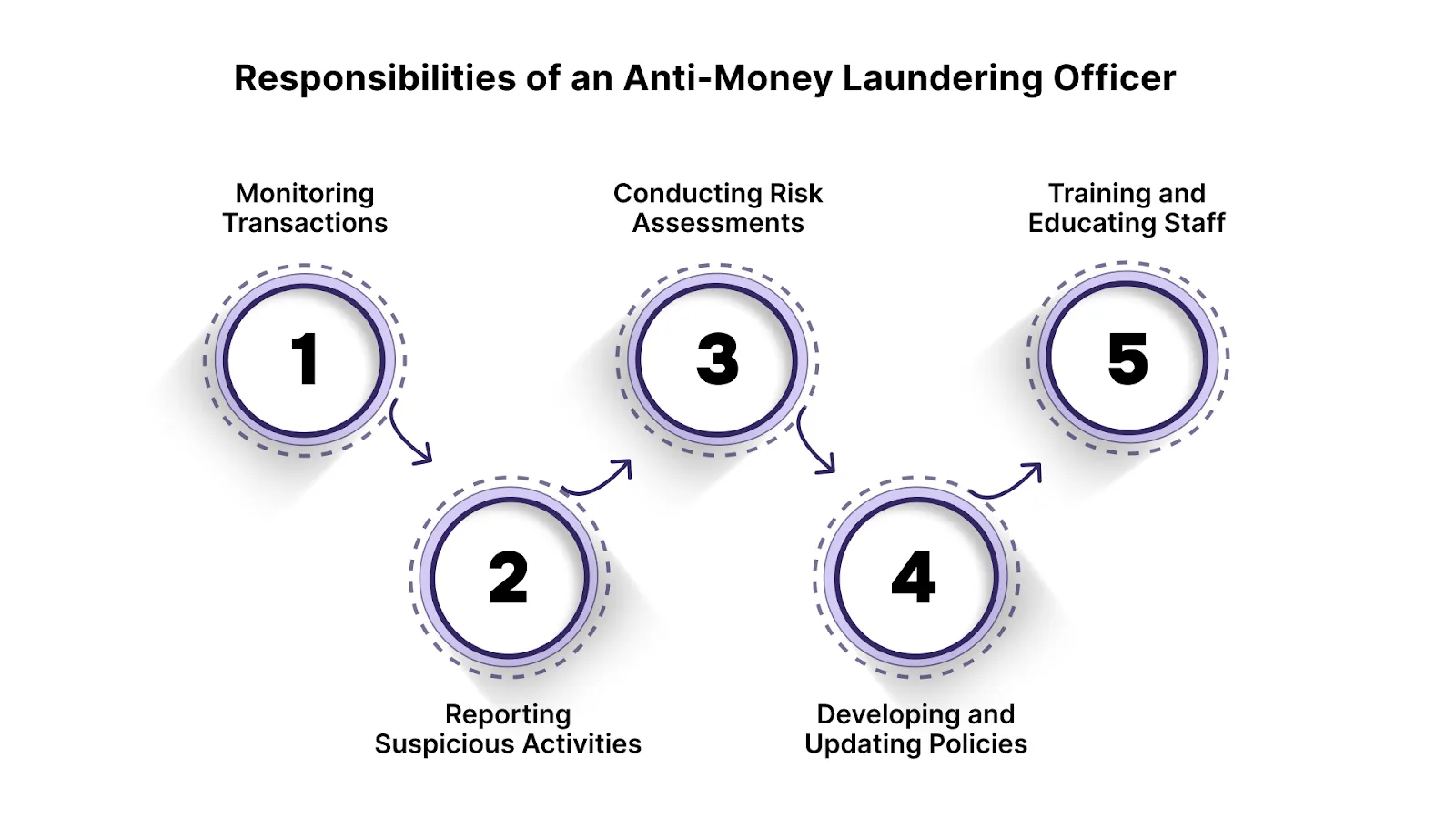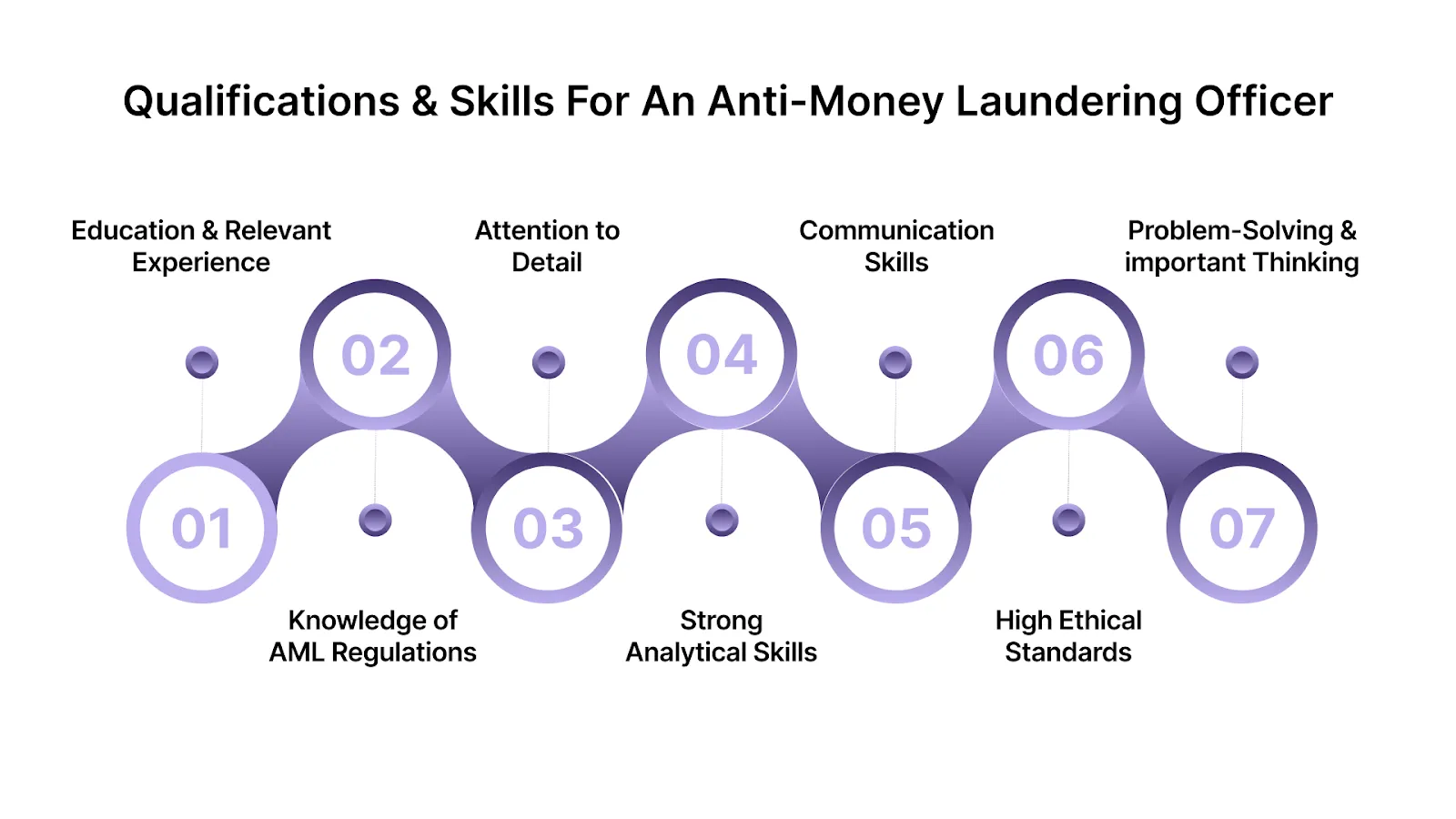Sep 30, 2025
How Anti-Money Laundering Officers Prevent Financial Crime

By Fraxtional LLC

Running a growing business, especially in FinTech, can be exciting but also demanding. With new opportunities emerging every day, leaders often face the challenge of keeping up with complex and changing regulations. The last thing you want is to face the consequences of financial crimes like money laundering. This not only affects your reputation but could also put your business at significant risk. According to the United Nations Office on Drugs and Crime, money laundering accounts for up to 5% of global GDP, highlighting just how widespread and dangerous this issue is.
This is where an anti-money laundering officer plays a key role. These professionals are actively working to safeguard your business, ensuring that it stays compliant with the law. Their responsibility is to help you grow and scale while keeping compliance risks in check.
In this article, we will explore the responsibilities of an anti-money laundering officer, why their role is increasingly important, and how they help your business stay secure and ready for the future.
In a nutshell
- Monitor Financial Transactions: AML officers review financial transactions to detect suspicious activity, using advanced tools to identify potential money laundering or fraud.
- Report Suspicious Activities: They file Suspicious Activity Reports (SARs) to authorities when money laundering is suspected, ensuring compliance with regulations.
- Conduct Risk Assessments: AML officers evaluate customer and transaction risks to prioritize efforts in mitigating threats and managing financial crime risks.
- Develop and Update Policies: They create and maintain policies to ensure compliance with anti-money laundering laws, adjusting them as needed to address emerging risks.
- Train and Educate Staff: AML officers implement training programs to ensure employees can recognize and address suspicious activities, fostering a culture of compliance within the organization.
What does an Anti-Money Laundering Officer do?

An Anti-Money Laundering Officer (AML Officer) ensures that an organization complies with anti-money laundering (AML) regulations, which is important in sectors like banking, real estate, casinos, and legal and accounting services. Their primary role involves monitoring financial transactions for suspicious activity, assessing potential risks, and investigating any signs of money laundering or financial crimes.
They use transaction monitoring software to detect unusual patterns, update compliance policies, and address regulatory violations. AML officers also provide staff training, track high-risk clients, and ensure that the organization adheres to all legal requirements to prevent financial crime. By overseeing these processes, AML officers play a vital role in protecting the organization from legal and financial risks, ensuring the integrity of its operations.
Key Responsibilities of an Anti-Money Laundering Officer
An anti-money laundering officer (AML officer) is integral to a financial institution's defense against illicit activities. Their role encompasses various responsibilities to ensure compliance and protect the organization from financial crimes.
The financial crime epidemic is growing, with global financial crimes projected to reach $3.1 trillion in 2024 alone. This highlights the increasing importance of the AML officer in combating such crimes and maintaining the integrity of financial systems.

1. Monitoring Transactions
AML officers are tasked with scrutinizing financial transactions to detect suspicious activities. Utilizing advanced systems, they analyze transaction patterns to identify anomalies that may indicate money laundering or other illicit activities. This vigilant monitoring is important for early detection and prevention of financial crimes.
- Regularly review and analyze transactions for irregularities.
- Employ sophisticated tools to detect potential financial crimes.
- Identify and flag activities that could suggest illegal actions.
2. Reporting Suspicious Activities
Upon identifying suspicious activities, AML officers are responsible for reporting them to the appropriate authorities. This includes filing Suspicious Activity Reports (SARs) when money laundering or terrorist financing is suspected. Timely and accurate reporting is essential to comply with regulations and assist law enforcement in investigations.
- Submit SARs promptly when suspicious activities are detected.
- Ensure proper documentation of all reported activities.
- Collaborate with law enforcement to support investigations.
3. Conducting Risk Assessments
AML officers assess the risks associated with different customers, services, and transactions. By evaluating these risks, they can identify high-risk areas and prioritize efforts to mitigate potential threats. This proactive approach helps safeguard the institution against financial crimes.
- Evaluate customer and product risk profiles.
- Identify high-risk areas and develop strategies to manage them.
- Review and adjust risk mitigation strategies as needed.
4. Developing and Updating Policies
Creating and maintaining internal anti-money laundering policies is another key responsibility. AML officers ensure that these policies are up-to-date, effective, and aligned with the latest regulatory requirements. They work to ensure that the institution follows best practices for detecting and preventing money laundering.
- Create and maintain anti-money laundering policies.
- Ensure policies comply with current regulations.
- Regularly review and update policies to address emerging risks.
5. Training and Educating Staff
AML officers are responsible for ensuring that staff are well-trained in anti-money laundering practices. They develop training programs that help employees understand their legal responsibilities and identify suspicious activities. This ongoing education helps create a culture of compliance within the organization.
- Develop and implement AML training programs for staff.
- Keep employees informed about regulatory changes and best practices.
- Ensure staff are capable of recognizing potential money laundering signs.
Anti-money laundering officer plays an important role in protecting financial institutions from illicit activities. Through diligent transaction monitoring, regulatory compliance, risk assessments, policy development, and staff training, they help maintain the integrity of the financial system. With financial crime on the rise, their work is more essential than ever in reducing risks to the organization.
Qualifications and Skills Required for the Role of an Anti-Money Laundering Officer
To succeed in this position, candidates must possess a mix of technical expertise, experience, and soft skills. Here are the key qualifications and skills required for the role:

1. Education and Relevant Experience
While there are no strict academic prerequisites for this role, a bachelor’s degree in finance, accounting, or a related field is often preferred. Employers typically seek candidates with several years of experience in related fields such as banking, law enforcement, or regulatory compliance. This experience equips candidates with the practical knowledge required to manage the complexities of anti-money laundering (AML) responsibilities effectively.
2. Comprehensive Knowledge of AML Regulations
A deep understanding of anti-money laundering laws is essential. An anti-money laundering officer must be well-versed in current AML regulations and continuously update their knowledge to adapt to new rules and global financial crime standards. In particular, staying abreast of regulatory changes across regions like the US, Canada, UK, and the EU is important for maintaining compliance in a changing regulatory environment.
3. Attention to Detail
In this role, attention to detail is important. AML officers must closely examine financial transactions to detect inconsistencies or suspicious activities. Identifying patterns, discrepancies, or anomalies in customer behavior or financial transactions ensures that potential money laundering activities are caught early. This skill helps reduce the risk of compliance failures and financial losses due to criminal activities.
4. Strong Analytical Skills
An anti-money laundering officer must be adept at analyzing large volumes of data. They should possess the ability to identify trends or behaviors that might indicate money laundering or financial fraud. These analytical skills are key to spotting red flags that others might overlook, ensuring a robust defense against financial crimes.
5. Effective Communication Skills
Clear and concise communication is vital in this role. AML officers must be able to write detailed reports, clearly articulate their findings, and communicate effectively with both internal teams and external regulators. Strong communication ensures that issues are raised and addressed promptly and helps maintain transparency with regulators and law enforcement agencies.
6. High Ethical Standards
Ethics are at the core of an anti-money laundering officer’s responsibilities. They must maintain the highest level of integrity, ensuring compliance with laws while avoiding conflicts of interest. A commitment to ethical behavior ensures that all investigations and actions are conducted fairly and in accordance with legal requirements, minimizing the risk of non-compliance.
7. Problem-Solving and important Thinking
AML officers often encounter complex situations that require quick thinking and effective problem-solving. Their ability to make informed decisions under pressure, especially when dealing with suspicious transactions or unclear cases, is essential. Proactive problem-solving helps prevent potential compliance issues from escalating into larger risks for the business.
From staying up-to-date with AML regulations to ensuring the business adheres to high ethical standards, this role is integral to maintaining financial integrity. With a strong foundation in these qualifications, an AML officer helps protect the business from the risk of financial crimes, ensuring compliance and building trust with stakeholders.
Compliance Framework and Regulatory Environment

The role of an anti-money laundering (AML) officer is to ensure a business complies with both national and international regulations, such as those set by the Financial Action Task Force (FATF) and the European Union (EU). This involves creating and maintaining compliance programs that detect and prevent financial crimes while protecting the company from legal and reputational risks.
By adhering to these frameworks, the officer ensures the business is prepared for audits and aligned with evolving global standards.
Regulatory Framework: The Anti-Money Laundering Officer's Role in Maintaining Compliance
The AML officer ensures that the company adheres to applicable AML regulations. Key responsibilities include:
- Developing policies: Establishing clear guidelines that align with KYC, AML monitoring, and Suspicious Activity Reporting (SAR).
- Implementing controls: Creating systems to detect suspicious transactions and mitigate risks.
- Reporting and audits: Ensuring the company files necessary reports with authorities and is ready for audits.
These actions protect the organization and maintain compliance with both existing and evolving regulations.
Collaboration with Authorities: Combating Financial Crimes Together
The AML officer works with law enforcement and regulatory bodies to identify and prevent financial crimes. This collaboration includes:
- Coordinating with authorities: Sharing relevant information with government agencies and financial institutions.
- Filing SARs: Reporting suspicious transactions to the proper authorities.
- Staying informed: Monitoring changes in regulations and adapting the company’s practices accordingly.
By working together, the officer ensures the company complies with global standards and contributes to combating financial crime.
Challenges Faced by an Anti-Money Laundering Officer

An anti-money laundering (AML) officer’s role comes with its share of complex challenges, especially in an environment where criminals are constantly evolving their strategies. AML officers must adapt and maintain compliance in an ever-changing landscape.
1. Keeping Pace with Evolving Criminal Strategies
AML officers must remain alert to constantly changing methods used by criminals to launder money. As financial crimes evolve, it is important for officers to stay informed and adjust their strategies to address new risks.
2. Complex Real Estate Transactions
Certain high-value transactions, especially in areas like real estate or large-scale investments, may raise concerns. These transactions often don’t align with a client’s usual profile, and without proper checks, they can become potential pathways for money laundering.
3. Shell Companies and Offshore Structures
The use of shell companies and offshore structures is common in money laundering schemes. These structures are designed to hide ownership and move illicit funds across borders, which makes identifying them a difficult task for AML officers.
4. Insufficient Client Documentation
When clients are reluctant to provide required documentation for verifying the source of their funds, it poses a significant challenge for AML officers. Without this information, it becomes difficult to assess whether a transaction is legitimate or suspicious.
5. Irregular Transfer Patterns
AML officers often deal with transactions that fall outside a customer’s typical behavior or business practices. These unusual patterns can signal potential money laundering, and timely investigation is essential to mitigate risks.
While these challenges can be daunting, the role of an anti-money laundering officer is instrumental in managing these complexities. By understanding and addressing these challenges head-on, AML officers ensure that financial institutions can maintain compliance and secure their operations against financial crimes.
Impact of an Anti-Money Laundering Officer on Financial Institutions

As AML officers work tirelessly to identify and mitigate risks, their impact on financial institutions is profound. By addressing the challenges outlined above, they safeguard the integrity of the institution, contributing to its long-term success and sustainability.
1. Maintaining Compliance and Integrity
AML officers ensure that financial institutions adhere to local and global regulations. By preventing money laundering, they protect the organization from financial penalties and damage to its reputation.
2. Promoting Transparency and Accountability
AML officers help institutions maintain clear and open records by implementing effective monitoring systems. This promotes transparency and helps build trust with both clients and regulatory bodies.
3. Supporting Risk Management
AML officers contribute to the institution’s risk management strategy by identifying high-risk clients and transactions. Their work helps the organization make informed decisions about potential risks and take appropriate actions to manage them.
5. Strengthening Trust and Long-Term Growth
By safeguarding against illicit activities, AML officers contribute to the institution’s reputation as a reliable and trustworthy organization. This trust fosters stronger relationships with clients and investors, enabling the institution to grow over time.
An anti-money laundering officer’s role is essential to maintaining the security and trustworthiness of financial institutions. Their work not only helps ensure compliance but also contributes to the long-term success and stability of the organization.
Fraxtional: Your Trusted Partner for AML Reporting and Compliance

At Fraxtional, we understand the challenges financial institutions face in maintaining compliance with anti-money laundering (AML) regulations. Staying ahead of potential risks and ensuring your business complies with the latest legal requirements is important. That’s where we come in.
Our AML Reporting and Compliance Consultant services support businesses, particularly in the fast-paced FinTech sector, to navigate AML complexities. We provide tailored strategies that reduce risks and ensure your institution remains audit-ready and aligned with global compliance standards.
Here’s how Fraxtional helps:
- Comprehensive AML Solutions: From transaction monitoring to risk assessments, policy development, and reporting, we ensure your business is prepared for potential financial crime threats.
- Regulatory Compliance: Fraxtional keeps you updated with evolving AML regulations across regions like the US, UK, EU, and Canada, helping you avoid costly penalties.
- Risk Management Strategy: We identify high-risk clients and transactions, assess potential threats, and implement strategies to safeguard your institution.
- Staff Training: Our training programs equip your team to identify suspicious activities and follow AML best practices.
Fraxtional provides the expertise and tools needed to maintain compliance and security, ensuring your business is always prepared for evolving financial crime risks.
Conclusion
An anti-money laundering officer is essential for protecting financial institutions from illicit activities. By monitoring transactions, assessing risks, and developing compliance policies, AML officers ensure businesses remain secure and compliant. Their role is important to maintaining both the financial integrity and the long-term success of an organization.
As the threat of financial crime grows, AML officers’ work is vital in reducing risks and building trust, helping institutions stay competitive in a complex regulatory environment.
Ensure your financial institution stays ahead of compliance risks. Contact Fraxtional today to discover how our AML reporting and compliance consultant services can help you stay secure and compliant.
FAQs
The role of an anti-money laundering officer can vary based on the industry. In financial institutions, they focus on transaction monitoring and compliance, while in sectors like real estate or casinos, they may deal with specific risks such as large cash transactions or high-stakes gambling. The AML officer adapts their strategies to meet the unique challenges of each industry.
When an anti-money laundering officer identifies suspicious activity, they are responsible for filing Suspicious Activity Reports (SARs) with the relevant authorities. The officer ensures that these reports are accurate and timely, assisting law enforcement agencies in investigating potential financial crimes.
AML officers must stay informed on emerging risks, including those associated with cryptocurrency and digital assets. They monitor transactions involving these new technologies closely, applying risk assessment tools and adjusting compliance protocols to handle the unique challenges posed by decentralized finance systems.
Anti-money laundering officers implement ongoing training programs for staff to ensure they are aware of current regulations and recognize signs of suspicious activity. This continuous education helps foster a culture of compliance within the organization and ensures that employees can effectively contribute to the detection of financial crimes.
blogs
Don’t miss these
Let’s Get Started
Ready to Strengthen Your Compliance Program?
Take the next step towards expert compliance solutions. Connect with us today.




